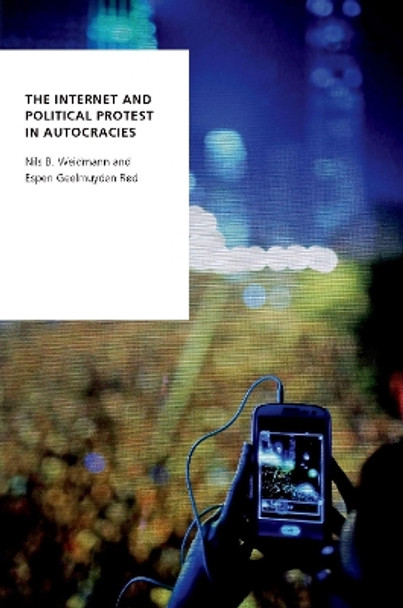Description
About the Author
Nils B. Weidmann is Professor of Political Science at the University of Konstanz. He was a post-doctoral researcher in the Woodrow Wilson School at Princeton University (2009-2010) and the Jackson Institute at Yale University (2010-2011), and has held a Marie Curie fellowship at the Centre for the Study of Civil War at the Peace Research Institute Oslo (2011-2012). Espen Geelmuyden Rod is a Postdoctoral Researcher at the Department of Peace and Conflict Research, Uppsala University. Previously, he was a Postdoctoral Researcher at the Communication, Networks and Contention Research Group, University of Konstanz and a Researcher at the Peace Research Institute Oslo (PRIO).
Reviews
Particularly valuable are the detailed descriptions of methods and of data analysis in the appendix... Recommended. * J.G. Everett, University of Colorado at Denver, CHOICE *
On the whole, this is a book that stands out for a number of reasons. Chief among them is the methodological rigor, sophistication, and detail in a newly constructed dataset that breaks new ground in terms of data collection and granularity... This sort of precision and specificity, especially across nations and over time with advanced multilevel models are a true strength of the book, and make it a highly important and worthwhile read for anyone working the field or with a passion to better understand the impact of Internet technologies within autocracies... Highly recommend. * Jacob Groshek, Journal of Information Technology & Politics *
The book is an incredibly important contribution, both empirically and theoretically, to our understanding of how new technologies have an impact on protest. It reveals new questions and new lines of inquiry that I look forward to seeing explored further in future work and should certainly be read by anybody with an interest in the internet and political behavior or in contention in the digital age. * Megan MacDuffee Metzger, Perspectives on Politics *
With admirable clarity, transparency and consistency, Weidmann and Rod tackle some of the key questions in the debate on how digital technologies impact authoritarian rule. The book is a must-read for those interested in the impact of digital technologies on authoritarian politics, and the MMAD database will serve scholars interested in protest under authoritarian rule for many years to come. * Kris Ruijgrok, Democratization *
This detailed and rigorous work gives empirical precision to the debate between 'cyber-optimists'...and 'cyber-pessimists'... Weidmann & Rod should be congratulated for producing such a well-crafted book. * Journal of Peace Research *
Bringing to bear new fine-grained data and a novel theory, Weidmann and Rod have a fresh take on the essential question of whether the Internet has shifted the power balance toward the autocrat or the protester. Taking a closer look at the dynamics of protest, this important book reveals when the Internet stabilizes autocrats and the moments when it thwarts them. * Margaret Roberts, UC San Diego, and author of Censored: Distraction and Diversion Inside China's Great Firewall *
Weidmann and Rod have delivered a tour-de-force that will shape the study of the internet and protest for years to come. By differentiating between the communication technologies required to start and sustain protest movements, the authors provide critical insights for organizers in authoritarian regimes. Although internet communication rarely helps to lift movements off the ground, online communication can help to amplify movements in ways that help to sustain them. Paradoxically, this amplification can also extend to incidences of repression, which can lead to demobilization as well. Weidmann and Rod rely on a sophisticated analysis of new data to show why both cyber-optimists and cyber-pessimists are both right, albeit at different phases of mobilization. An essential read. * Erica Chenoweth, Professor of Public Policy, Harvard University *
Through the use of precisely crafted computational tools and analytical arguments,Weidmann and Rod discover new, unsettling, evidence thatinternet access and control can and does fuel repression. This work overturns the naive, but widely held view, that the expansion of theinternet would liberate the world, unconditionally. It is a must read, and a wake-up call for researchers, policymakers, and internet leaders * Michael Colaresi, William S. Dietrich Chair of Political Science, University of Pittsburgh *
Weidmann and Rod present an original, compelling, and nuanced explanation of when the Internet can affect liberalization and when it cannot. Cutting-edge statistical analyses of a new dataset and brilliant graphical presentations are employed to counter the over-optimistic claim that the Internet is an overwhelming force of political transformation. It's much more complicated. Alas, autocracies that can harbor the power of social media can expand their repressive capacities to maintain control and limit the occurrence of protest. Liberalization only occurs when on-going protest is sustained beyond the early phases of the conflict. * Scott Gates, Research Professor, Peace Research Institute Oslo (PRIO), and Professor, University of Oslo *
Awards
Winner of Winner of the APSA Information Technology and Politics Best Book Award Honorable Mention, APSA Conflict Processes Section Best Book Award.
Book Information
ISBN 9780190918309
Author Nils B. Weidmann
Format Hardback
Page Count 216
Imprint Oxford University Press Inc
Publisher Oxford University Press Inc
Weight(grams) 459g
Dimensions(mm) 159mm * 241mm * 18mm







